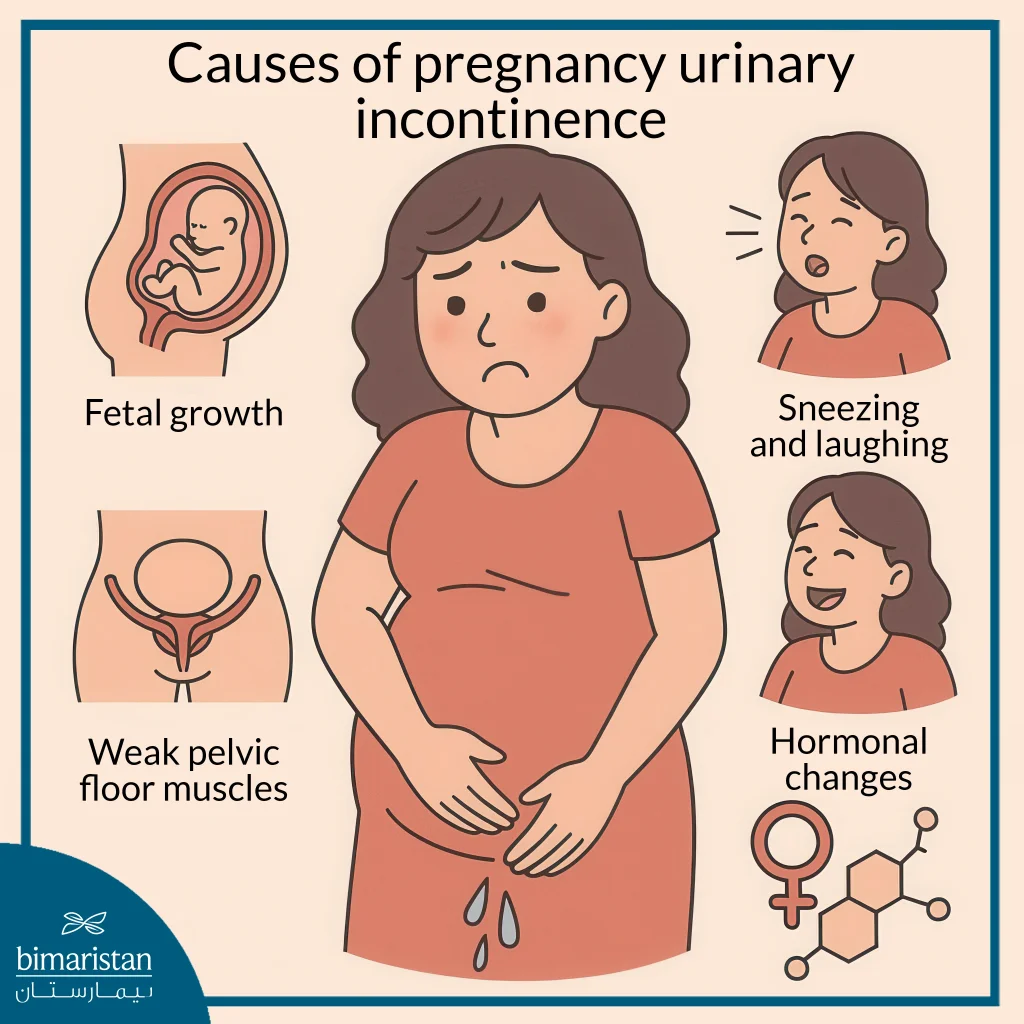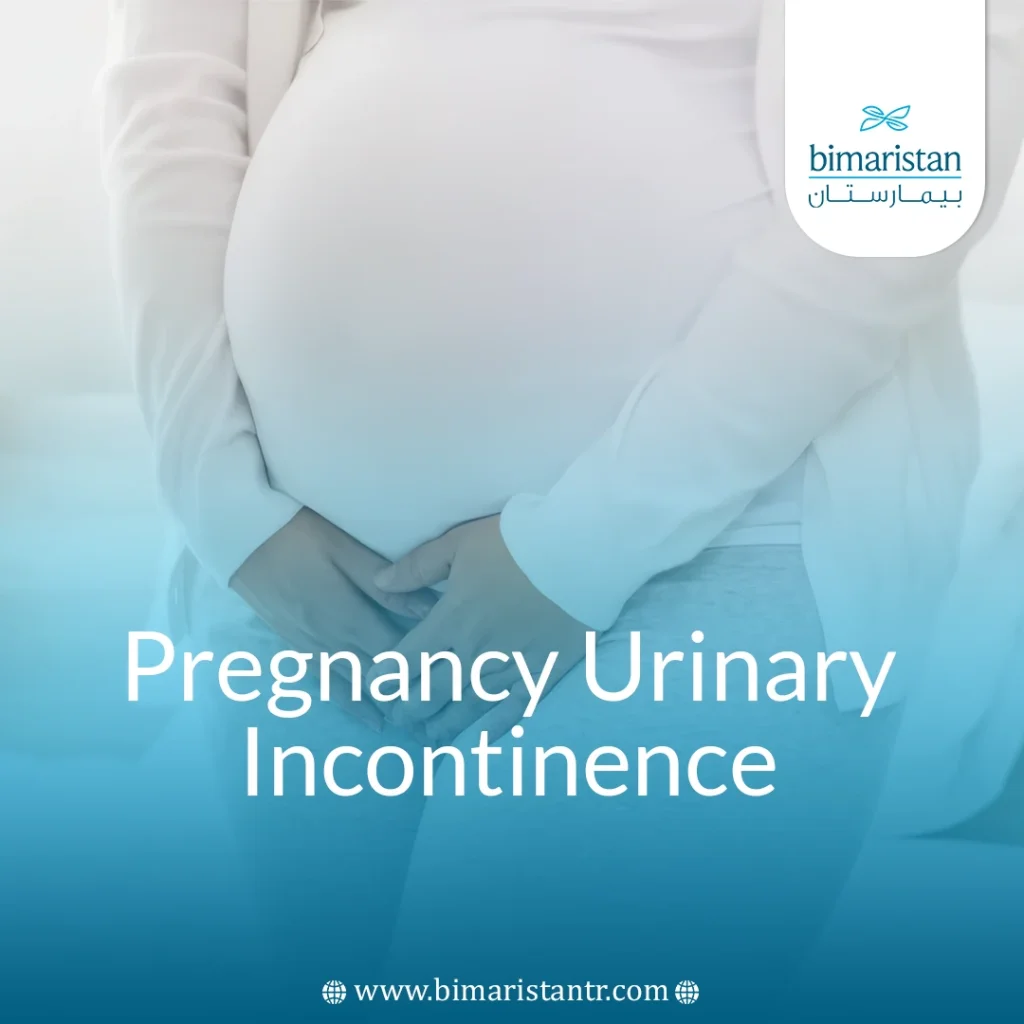Studies indicate that nearly 50% of expectant mothers experience pregnancy urinary incontinence, particularly in the third trimester, as a result of increased fetal pressure on the bladder. Thankfully, most cases resolve gradually postpartum with proper exercises and medical guidance. What matters most is not hesitating to consult a healthcare provider for personalized support.
What is pregnancy urinary incontinence?
Pregnancy urinary incontinence is a condition marked by a loss of bladder control, leading to involuntary urination in small amounts. This urine leakage can range from occasional drops to full bladder release, with timing varying based on the type of incontinence. It may occur at inappropriate moments, triggering psychological and social distress for the woman, which can negatively impact her emotional well-being and potentially influence fetal development.
There are two main types of urinary incontinence, stress urinary incontinence and urge urinary incontinence:
- Stress incontinence: Caused by increased pressure on the bladder due to coughing, sneezing, laughing, or heavy lifting. It is more common in women after childbirth or after menopause, due to weakened pelvic muscles.
- Urge incontinence: Characterized by the sudden urge to urinate without warning and the inability to control the urinary sphincters. It may be caused by urinary tract infections, diabetes, or neurological conditions such as multiple sclerosis.
These conditions are not rare and can be embarrassing if they occur at inopportune times, but fortunately, they are treatable with specialized medical staff at a reliable medical center.
Causes of pregnancy urinary incontinence
The main causes of pregnancy urinary incontinence include increased pressure on the bladder due to the growing size and weight of the fetus, which reduces bladder capacity. Movements like sneezing or laughing heighten intra-abdominal pressure via the diaphragm, adding further strain on the bladder.
Additional contributing factors include hormonal changes during pregnancy that can affect bladder control, along with weakened pelvic floor muscles, especially in pregnant women. Those who have previously been pregnant or given birth are also at greater risk of developing urinary incontinence.

Symptoms of pregnancy urinary incontinence
The main symptoms of urinary incontinence in pregnant women are:
- Leaking urine when laughing or sneezing
- Sudden and frequent urge to urinate
- Constant sensation of not completely emptying your bladder
- Leaking urine while walking or sleeping
When does pregnancy urinary incontinence become a concern?
Pregnancy urinary incontinence may indicate a more serious issue, and it’s essential to consult your doctor if urine leakage is accompanied by any of the following:
- Symptoms of a urinary tract infection: Burning or pain during urination, foul-smelling and cloudy urine, fever or chills, and pain in the lower abdomen or back.
- If the leakage is profuse or persistent: Large amounts of urine may leak uncontrollably, resulting in frequent wetting of underwear or outerwear.
- Blood in the urine: May indicate an infection or kidney stones.
- If it persists after delivery: Most women experience improvement postpartum, especially when performing Kegel exercises. However, if incontinence persists for more than six weeks after delivery, it may require medical consultation and treatment.
The cause of pregnancy urinary incontinence may differ from earlier explanations, as it can remain pregnancy-related even after childbirth. One such reason is significant pelvic muscle weakness developed during fetal growth, which may require targeted exercise therapy. If the condition persists over time, medical intervention from a specialist may become necessary.
Treatment for pregnancy urinary incontinence
Treatment for pregnancy urinary incontinence is neither impossible nor complicated, but it requires some conditions and commitments that the patient must commit to, such as starting to practice therapeutic exercises, adopting specific lifestyle modifications, and, if the incontinence persists, seeking professional medical intervention.
Therapeutic exercises
Kegel exercises are the primary exercises in this context, which strengthen the pelvic muscles of pregnant women, and they might be the treatment for this condition. Kegel exercises are performed by first taking a deep breath, then contracting the pelvic muscles for 3-5 seconds, followed by a complete relaxation of the body for 5-10 seconds, and repeating this process 10-15 times, three times a day. Breathing and pelvic exercises under the supervision of a physiotherapist are also useful in treating pregnancy urinary incontinence.
Lifestyle changes
It starts with reducing the amount of caffeine and urinary irritants consumed by the patient, distributing water intake throughout the day to support kidney function and promote urinary tract health, emptying the bladder regularly, and not holding urine voluntarily inside the bladder, but instead emptying it directly when needed.
Medical treatment
If pregnancy urinary incontinence persists without signs of improvement or response to basic interventions, medical treatment becomes necessary. Initially, the use of absorbent pads is advised to reduce the emotional discomfort and social embarrassment the patient may experience. In some cases, medications may be prescribed as part of the treatment plan, though these are typically introduced only after childbirth to avoid any potential risk to fetal development.
Does pregnancy urinary incontinence affect childbirth?
Urinary incontinence can affect childbirth, but indirectly, as pregnancy urinary incontinence can be a sign of weak pelvic muscles due to the pressure from the growing uterus on the bladder. The weakness of these muscles can make it difficult for a woman to push during delivery, which manifests in prolonged labor. In addition, weak pelvic floor muscles increase the risk of rupture during delivery.
Preventing pregnancy urinary incontinence
Preventing pregnancy urinary incontinence is largely achievable, as exercises that strengthen the pelvic floor muscles significantly contribute to addressing this issue. In addition, women should avoid gaining weight to prevent increasing the load on their pelvic muscles and thus causing urinary incontinence. They should also try to empty their bladder regularly and refrain from holding urine for a long time. These methods significantly contribute to preventing pregnancy urinary incontinence, allowing women to have a healthy pregnancy and childbirth.
In conclusion, pregnancy urinary incontinence is a frequent condition that often resolves after childbirth, yet it remains important to seek medical advice if concerning symptoms arise. At Bimarestan Medical Center, we provide specialized support through a skilled healthcare team to help you navigate this stage with comfort and confidence.
Sources:
- American College of Obstetricians and Gynecologists. (2020). Urinary incontinence during and after pregnancy.
- National Institute of Diabetes and Digestive and Kidney Diseases. (2021). Bladder control problems (urinary incontinence) during pregnancy.
